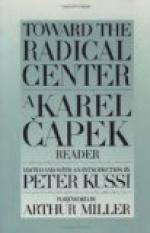|
This section contains 2,490 words (approx. 9 pages at 300 words per page) |

|
SOURCE: "Karel Capek's Apocrypha and Franz Kafka's Parables," in The American Slavic and East European Review, Vol. XVIII, April, 1959, pp. 238-47.
In the excerpt below, Gibian discusses similarities between the tales of Čapek's Apocryphal Stories, concluding "His apocrypha amuse, rather than disturb us. Even their iconoclasms and satire are mild, optimistic, gentle."
The general principle basic to Capek's apocrypha is to take an historical situation and retell (and reinterpret) it by filling in background, adding to it, recreating, looking at it from a fresh angle, elaborating, taking a highly magnified or distorted view of it.
Čapek relies heavily on direct speech—talk—between two or more persons. Thus Čapek reports in detail the conversation between Sarah and Abraham when they discuss possible candidates in a vain attempt to identify ten just persons in Sodom. Thersites expounds to his fellow warriors his seditious, cynical, negative thoughts about the Trojan...
|
This section contains 2,490 words (approx. 9 pages at 300 words per page) |

|


